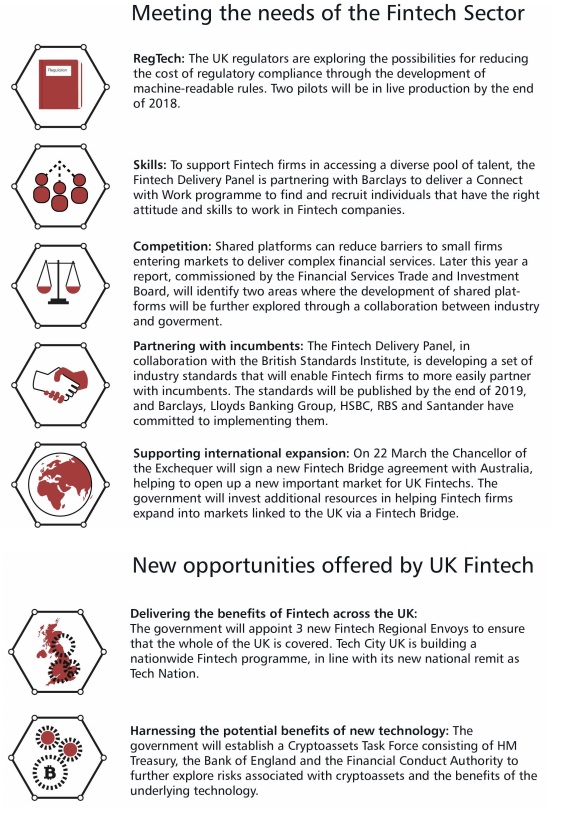There’s no doubt that the UK government recognises the importance of financial services, and in a rapidly changing technological environment the need for the UK to position itself as the best place in the world for fintech. On 22-March the UK Government launched the Fintech Sector Strategy: Securing the Future of UK Fintech. In this post, i share with you my summary notes from the Fintech Strategy, please do refer to the strategy paper for all the statistics and complete details.
1. What is Fintech?
The UK government paper defines fintech as an interchangeable term used to “describe both technology driven innovation across financial services and to pick out a specific group of firms that combine innovative business models with technology to enable, enhance, and disrupt the financial services sector“.
Alongside technology, innovation and disruption the UK government stresses the important role competition plays in enabling efficient, open and resilient economies.
2. UK Fintech – Are You Serious?
Yup – This section of the UK Fintech Sector Strategy hones in on the UK’s Fintech credentials thus far, citing the:
- UK Government’s Industrial Strategy to build a Britain fit for the future published in Nov-2017 highlights 5 foundations of productivity:
- Ideas – Making the UK the world’s most innovative economy
- People – Good Jobs & greater earning power for everyone
- Infrastructure – Upgrade to the UK’s infrastructure
- Business Environment – Making the UK the best place to start and grow a new business
- Places – Prosperous communities across the UK
- Fintech Sector Strategy focuses on the above “Business Environment” foundation, and “making the UK the best place in the world to start and grow a fintech business“
- EY 2015 report – ‘UK Fintech on the Cutting Edge’ stating how UK fintech revenue was £6.6 billion in 2015, people employed in the sector were greater than in New York….
- Benefits to the wider UK economy by targeting customers and products that are under-served by big banks and driving transformation in financial services
3. UK Fintech – What has been done so far?
- A key objective of the Financial Conduct Authority (FCA) is driving competition – who in turn created a Innovation Hub and Regulatory Sandbox
- Creation of Payment Systems Regulator (2015)
- In 2017, allowing non-bank payment service providers to access payment systems directly
- Mandating that big banks share SME credit data and refer any SMEs declined for finance to certain platforms
- Promoting competition by encouraging:
- Peer-to-peer lenders and other alternative finance providers
- Specific sector growth by eliminating barriers, such as in InsurTech
- In 2016, the Bank of England established a Fintech Accelerator
- Implementing measures to advance Artificial Intelligence technologies – Industrial Strategy: The Grand Challenges
- Creation of “Fintech Bridges” with countries, such as Hong Kong, Singapore, South Korea and China
- In 2016, instructing the 9 largest banks in the UK to deliver “Open Banking”
4. UK Fintech – Meeting the Future Needs of the Fintech Sector
- Reducing the costs, and removing the difficulties, associated with complying with Regulation
- Enabling access to qualified and suitable talent, with a focus on coding and software skills
- Facilitating access to finance
- Utilising Open Banking to drive competition and adopt Fintech services and solutions
- Promoting growth of Fintech companies and providing access to domestic and international markets
- By collaborating with incumbents
- Through the “Fintech Bridges” and a potential “global sandbox” provide opportunities to expand internationally and attract investments
- Ensuring stability through the Brexit discussions and beyond
5. UK Fintech – Opportunities Offered by UK Fintech
- Ensure that the benefits of Fintech are enjoyed by all groups across the UK
- By providing widespread physical connectivity (4G and super-fast broadband by 2020) and digital skills and training
- Enabling financial inclusion to those groups that have historically been underserved by traditional financial services firms
- Encouraging growth across all regions
- Utilising the potential of emerging technologies
- Recognising the applications and implications of technologies such as cryptoassets and Distributed Ledger Technologies
- Understanding the benefits and risks of emerging technologies
